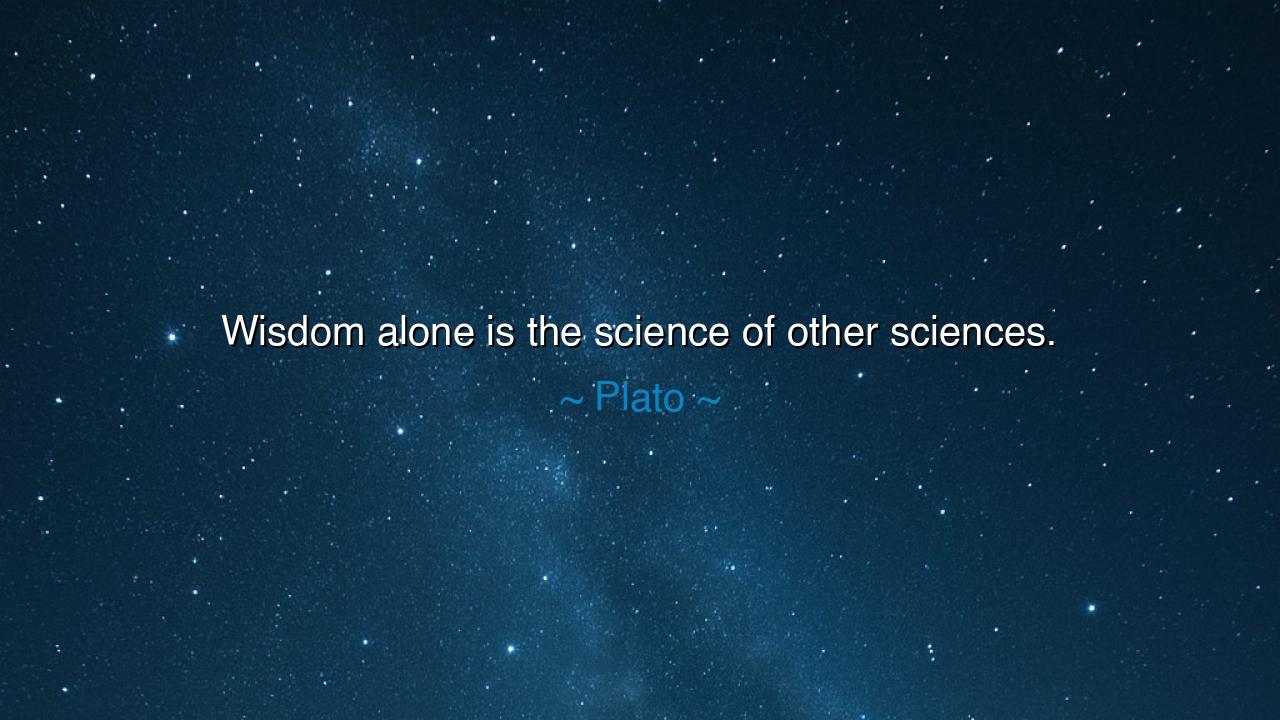
Wisdom alone is the science of other sciences.






"Wisdom alone is the science of other sciences." These words, spoken by the great philosopher Plato, speak to the very heart of human knowledge and the pursuit of truth. In an age where the world is divided into many fields of study, where knowledge is specialized and segmented, Plato’s proclamation invites us to remember that the highest form of understanding—the most profound insight—is not found in any single discipline, but in wisdom itself. Wisdom, in Plato's view, is the guiding force that binds all sciences together, for it is the art of recognizing the interconnection of all things, the deeper truths that underlie each area of knowledge.
What Plato is suggesting is that wisdom is not merely the accumulation of facts or expertise in a particular field. It is the ability to see the relationships between those facts, to understand how they fit together in the larger tapestry of existence. In this sense, wisdom transcends all other sciences—be it mathematics, philosophy, astronomy, or any other pursuit—because it recognizes the unity of knowledge. The scientist who seeks truth in the stars without understanding the nature of the soul is missing a piece of the puzzle. The philosopher who seeks the meaning of life without understanding the laws of nature is incomplete. Wisdom is the lens through which we see the true interconnections of all things, and through it, all other sciences find their meaning.
Take, for instance, the life of Archimedes, one of the greatest minds of antiquity. His brilliance in mathematics and engineering was undeniable, yet it was his profound understanding of the nature of truth and wisdom that allowed his discoveries to resonate through history. When Archimedes shouted “Eureka!” upon discovering the principle of buoyancy, he was not merely celebrating a mathematical breakthrough, but a moment of wisdom—a moment of seeing how one piece of knowledge fit into the greater puzzle of the universe. In this sense, wisdom allowed him to recognize the significance of his discovery beyond its mathematical formula; it gave him the insight to see the truth that lay beneath the surface of the world’s workings.
In the same way, the philosopher Socrates, Plato's teacher, demonstrated that true wisdom is found not in the accumulation of knowledge alone, but in the constant questioning and examining of one’s assumptions. Socrates believed that the highest form of knowledge was the recognition of one’s own ignorance, and through this humility, he sought to understand not only the particulars of the world but the very nature of human existence itself. Socrates did not concern himself merely with the facts of any given subject; he was concerned with the moral implications of those facts, with their relationship to the well-being of the soul. For him, wisdom was the science that governed all other sciences, for it illuminated the path to the truth that lay hidden in the depths of the human experience.
When Plato speaks of wisdom as the science of all sciences, he is urging us to remember that every field of knowledge has its limitations. While the mathematician may be able to calculate the universe’s dimensions, and the astronomer may chart the stars, only wisdom can place these discoveries in the context of our larger purpose. Knowledge alone can lead to mastery, but only wisdom can lead to true understanding. Without wisdom, our pursuit of knowledge can become fragmented and shallow, disconnected from the deeper truths of the world.
The lesson that Plato imparts is one of profound significance: no matter how much knowledge we acquire, it is wisdom that gives us the capacity to understand its true value. Wisdom allows us to see beyond the surface, to grasp the essence of things, and to apply that understanding in ways that enrich our lives and the lives of others. In a world where information flows endlessly, where facts and figures abound, it is wisdom that enables us to discern what is truly important. Wisdom is the guiding light that illuminates the path of the truth-seeker, showing us how to live in harmony with the deeper principles of life.
In practical terms, this means seeking not only knowledge but understanding. When you approach any subject—whether it be science, art, or human relationships—seek to understand not just the details, but the connection between them. Ask yourself how what you learn can be applied to improve the world around you, and how it fits into the broader narrative of human existence. Let wisdom guide you as you pursue your studies, as you navigate the complexities of life, and as you seek to deepen your understanding of the world and of yourself. For, as Plato teaches, wisdom alone is the science of all sciences, and it is the key to unlocking the true meaning of all knowledge.






AAdministratorAdministrator
Welcome, honored guests. Please leave a comment, we will respond soon